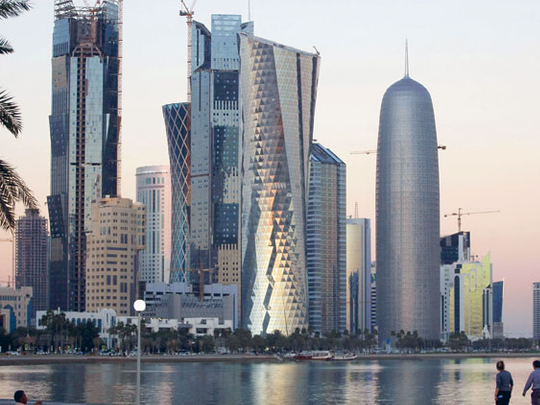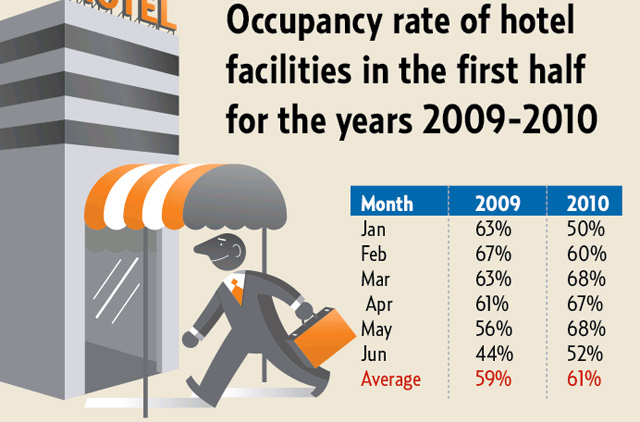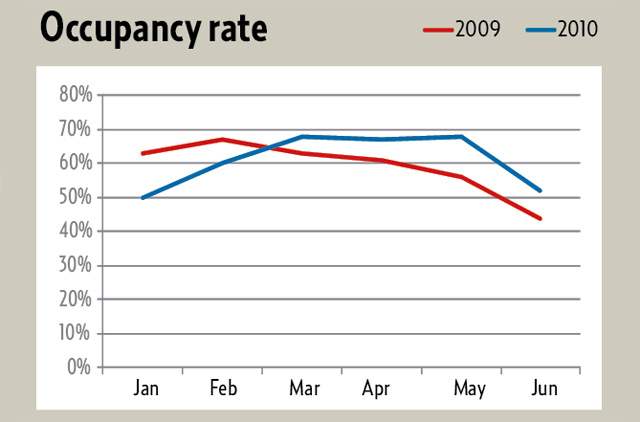
Doha: The hotel sector in Qatar reported an increase in the occupancy rate, rising two points in the first half of this year compared to the same period last year, a senior official of the Qatar Tourism Authority (QTA) said.
In his first-half report, Ahmad Al Nuaimi, chairman of QTA, said statistics show that the occupancy rate in the first half 2009 was 59 per cent compared with 61 per cent in the first half of 2010.
Revenues of four- and five-star hotels in the first half of the year exceeded those for the same period in 2008 and 2009.
The improvement can be attributed to the effort the state has made to increase tourism activities, and by hosting sporting and cultural events, the authority said. It is also due to the steady expansion of Qatar Airways into new routes despite the global economic recession, Al Nuaimi said.
Although the tourism industry is recovering from the global economic recession of 2009, the recovery is still a slow and cautious one.
QTA has adopted promotional plans to deal with the changes that the tourism industry is likely to face in the coming period. Likewise, investment in hotels continues.
Sign of recovery
Al Nuaimi said that "this increase is a sign of the recovery of the hotel sector... from the world economic crisis of 2009.
"And in spite of the decline in indicators for the global tourism industry to its lowest status in 2009, Qatar's interest in increasing tourism activities by promoting various unique attractions regionally and abroad, and the interest in sports and cultural tourism, led to positive results. This recovery in the hotel sector can also be attributed to the continuous expansion of Qatar Airways routes around the world, and raising the size of [its] fleet," he said.
The QTA also reported that several new hotels opened during the period, resulting in an expansion of capacity since 2009.
However, this has not adversely affected occupancy rates; on the contrary, as this report indicates, the occupancy rate rose from that of 2009. It is expected that the occupancy rate in the next six months will show an even better improvement as Qatar is hosting several events that will support tourism: exhibitions and conferences, cultural tourism and sports events.
This is in addition to QTA's efforts to attract tourists who come on business, encouraging them to extend their stay as part of the promotional tourism agenda set by QTA.
Asked about his forecast as well as plans for the coming period, Al Nuaimi said: "The year 2009 was the most difficult year for the world tourism industry due to the effects of the global economic crisis and the travel restrictions imposed because of the spread of the H1N1 virus. In that year, global rates of visits declined to less than 4 per cent, which is considered the worst rate in 60 years.
"And the number of international passengers fell from 950 million to 880 million. Despite the drop in tourism revenues globally by 6 per cent, this decline is considered the smallest compared with revenues of other commercial sectors, which suffered a decrease of 12 per cent."
As for the impact of the economic crisis on the tourism industry in the Arab region, it can be seen from the reports by the World Economic Forum and the World Trade Organisation (WTO) that the rates of visits to the Arab region are slightly lower than the global decline which reached 5 per cent.
However, the decline in Arab tourist revenue was lower by half the proportion of the global decline, reaching 3 per cent.
Domestic tourism
Al Nuaimi attributed this to the role that domestic tourism plays in bridging the shortfall suffered by the tourism industry by tourists coming from abroad.
In this regard, Al Nuaimi said that "this highlights the magnitude and importance of revitalising domestic tourism as an alternative in order to deal with crises in the tourism sector."
Although it is well known that domestic tourism does not fall within the sub-account of the state's revenues because it does not bring in foreign exchange, it does reduce the currency outflow, affecting operating income of national institutions rather than foreign exchange.
As for the changes this year in the tourism sector, and also forecast by the World Bank and International Monetary Fund, there are expectations of global economic growth of more than 4 per cent. And the WTO predicts that the growth in tourist traffic will range between 3 per cent and 4 per cent.
However, the recovery from the global economic crisis that hit in 2009 is still cautious and slow, and is not commensurate with the stronger global rebound.
For example, as soon as travel and tourism began to show a revival in the first quarter of this year, the industry faced a crisis caused by natural disasters including the volcanic eruption in Iceland which restricted air traffic on all other continents.
Then came the European debt crisis which forced governments to come to the rescue with massive bailouts, aggravating their federal debt levels.
In response, many countries have had to impose massive spending cuts and new fees for services. For the tourism and travel industry the most significant of these is the European departure tax, which is expected to have a negative impact on international air travel.
Among the countries adopting the tax are the United Kingdom, Germany and Spain, where it could cost, for example, for three people travelling abroad the equivalent of £150 (Dh861.52) to £200.
To address these situations Al Nuaimi said: "QTA has developed short-term promotional plans to attract tourists targeted in the current circumstances as well as to address changes at the global tourism level.
"We are focusing on the type of tourist to target for the future, not only by number but also including the length of stay and amount of money they spend."
Would you be interested in taking a weekend trip to Qatar? Do you take advantage of the UAE's location to explore the region and neighbouring countries when you have a few spare days?














